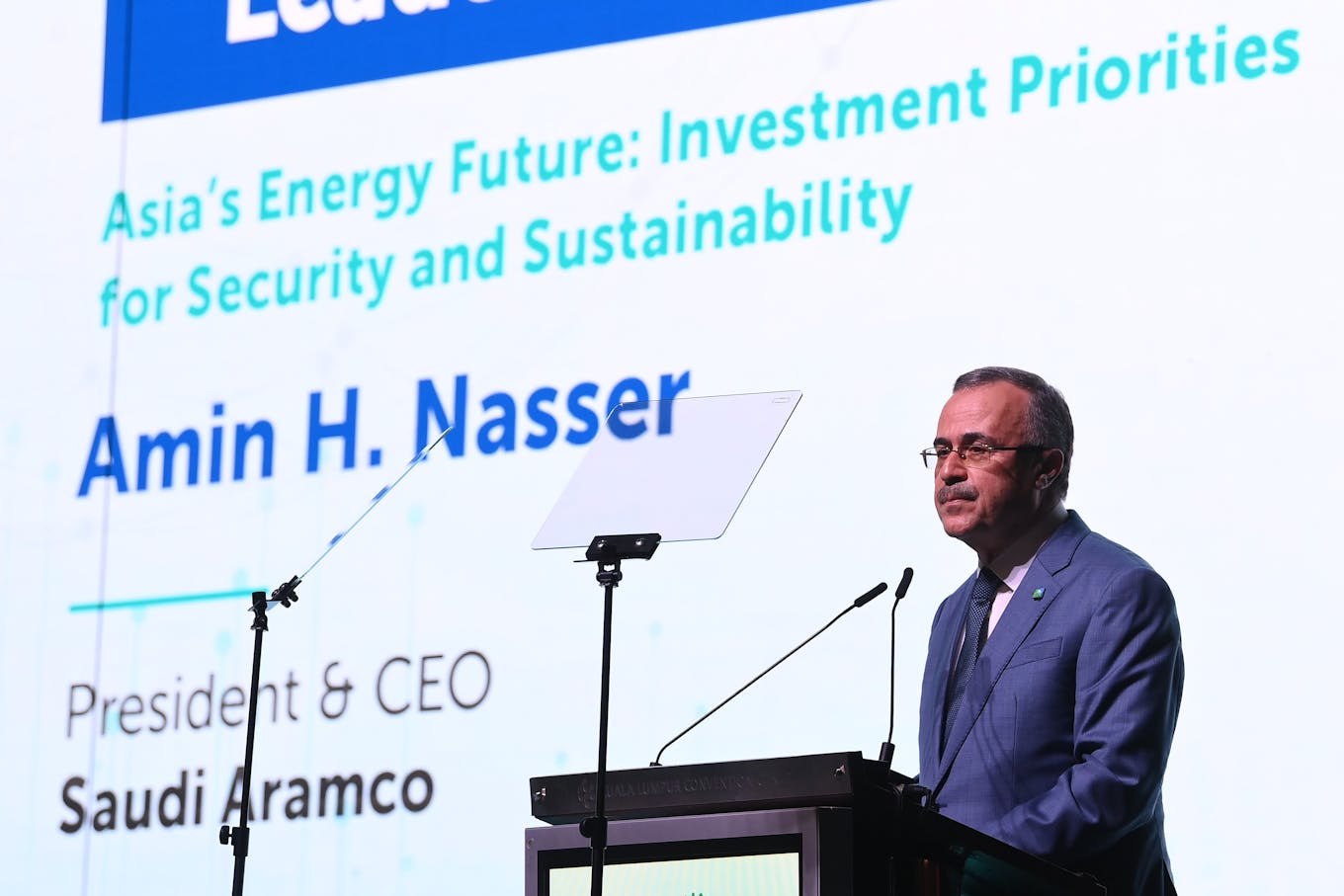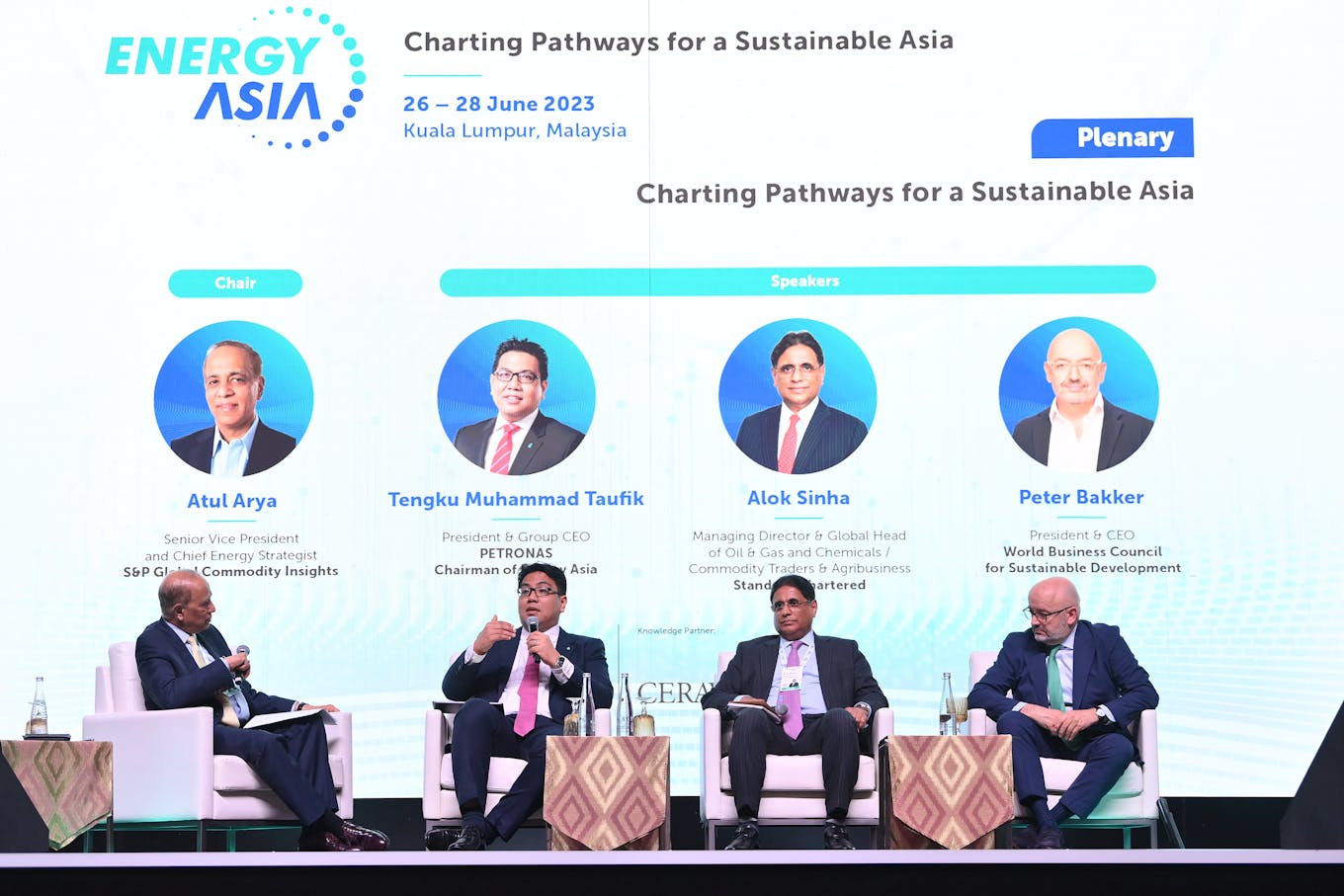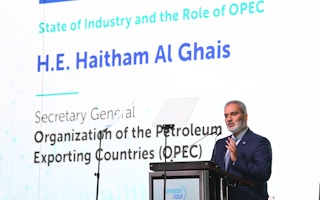It was to meant be a three-day conference bringing together policymakers and industry professionals to discuss how Asia can drive the energy transition, but conversations at Energy Asia 2023 have so far been dominated by oil majors who are defending their plans to expand investments in the upstream production of fossil fuels.
Setting the tone was the Organisation of Petroleum Exporting Countries (OPEC). “The world needs more oil, not less, alongside reducing emissions,” said Haitham Al Ghais, secretary general of the price-setting cartel in his opening remarks at the conference held in Kuala Lumpur from Monday (26 Jun).
While OPEC members are “significantly investing” in renewable energy, oil will remain “an integral part” of the energy mix, said Al Ghais. “Every data-based forecast that I have seen shows that oil is irreplaceable for the foreseeable future.”
The organisation expects oil to represent the largest share of the global energy mix by 2045 at 29 per cent, which would require a “massive energy expansion,” said Al Ghais. According to OPEC data, this would involve an increase of oil production to 100.6 million barrels of oil equivalent a day (mobe/d) compared to 88.3 mobe/d in 2021.
This view was echoed by Saudi Arabian state oil producer Saudi Aramco, whose president and chief executive officer Amin H Nasser pointed to continued healthy demand for oil from developing countries. Oil demand growth is at more than 2 million barrels per day, which is “high by historical standards,” he said.
The comments stand in stark contrast to warnings against further fossil fuel expansion. In March, United Nations secretary general Antonio Guterres reiterated the call for fossil fuel firms to stop all licensing or funding of new oil and gas as well as any expansion of existing oil and gas reserves. It echoes previous statements made by the International Energy Agency, which said that huge declines in the use of coal, oil and gas are required in order for the world to achieve net-zero emissions by 2050, and to prevent a climate catastrophe.
The Intergovernmental Panel on Climate Change (IPCC), in its latest report, said that greenhouse gases produced by existing oil and gas infrastructure is more than enough to push the world beyond the 1.5 degree Celsius tipping point for global warming.
At the conference, industry leaders representing fossil fuel interests say Asia is witnessing rapid economic growth and its population is booming – trends that will drive energy demand in the coming years. There is, hence, a disproportionate need for developing countries in the region to rely on oil as a secure and affordable energy source, they say.
Daniel Yergin, vice chairman at commodities market research firm S&P Global, believes that oil and gas will continue to be a major part of global energy sypply, even as the overall energy mix changes.

Energy security and affordability are under-emphasised compared to environmental sustainabilty in the global energy transition conversation, said Amin H. Nasser, president and chief executive officer of Saudi Arabian oil company Saudi Aramco. Image: Energy Asia
Aramco’s Nasser is sceptical of whether the currently “popular energy transition narrative” adequately reflects Asia’s interests. “Existing transition policies rightly attempt to address environmental sustainability, but the equally critical issues of energy security and affordability are under-emphasised.”
Prime minister of Malaysia Anwar Ibrahim, in his keynote speech, said: “Affordability remains a key concern, particularly for parts of developing Asia, where people are not looking too far into the future, but might simply be struggling to pay the bills or put food on the table daily.”
He added that lowering carbon emissions should not come at the expense of economic growth, or vice versa. Alongside the need to transition to clean energy, Malaysia must also ensure that its existing policies of alleviating poverty and providing quality education, healthcare and infrastructure are not compromised, said Anwar. The country is the second largest producer of oil and gas in Southeast Asia.
Anwar also stressed the importance of natural gas in Malaysia’s energy mix as the country transitions towards less carbon-intensive sources of energy. Gas remains Malaysia’s most significant energy feedstock and will act as a “stabilising factor” as the country ramps up development of renewable energy and cleaner alternative fuels such as hydrogen and ammonia, at least over the next 20 to 25 years, said Malaysian economy minister Rafizi Ramli.
Coal-dependent Indonesia is exploring a similar pathway towards renewable energy that is first supported by liquified natural gas, prior to transitioning to renewable energies, said its minister of energy and natural resources Arifin Tasrif. He estimated that Indonesia has the potential to produce some 3,000 gigawatts of renewable energy, mostly via solar, but it requires mining of minerals and cooperation from financial institution and businesses to produce the relevant infrastructure.
“Countries in Asia are not climate deniers. In fact, we are showing positive signs of embracing the energy transition. But we need to move at a different pace,” Anwar said.
‘Energy chaos’
Increasing investor aversion towards fossil fuels has hit producers hard, with “chronic underinvestment” putting the whole energy system at risk, said OPEC’s Al Ghais.
“For oil, we have heard appeals over the last year or so for producing countries to play a key role in ensuring stable and sustainable global energy supplies. At the same time, however, we have also constantly heard goals to end financing and oil projects. The two sentences simply do not fit together,” he said.
“Talk of no new investments in oil projects will only lead to energy chaos. We need energy clarity, not energy chaos.”
“
We don’t want to create energy chaos, but we also don’t want to create climate chaos.
Peter Bakker, president and chief executive officer of the World Business Council for Sustainable Development
Malaysia’s national oil company Petronas has seen financial institutions reject even their requests to fund research and development efforts into emissions reduction, said its chief executive officer Tengku Muhammad Taufik.
For instance, banks have turned away from financing carbon capture and storage solutions, calling it the industry’s “excuse to legitimise continuing the production of fossil fuels,” said Taufik, voicing frustration at fossil fuel companies being seen as “the root cause of all evil when it comes to emissions reduction”.
“We heard as early as the 26th UN Conference of Parties (COP26) that US$130 trillion of assets were promised towards the energy transition under the Glasgow Financial Alliance for Net Zero (GFANZ). Not much has been heard since by way of disbursement,” he said.
“Conversely, redirecting that money to renewables, a space where policy frameworks aren’t mature, face a risk premium in emerging economies where there is no track record. So where does that leave us?” asked Taufik. “I hazard a guess that national oil companies will be forced to make a choice between energy security and affordability, and we will make sure it’s affordable and secure first, rather than (focus on) the energy transition.”
Taufik called on financial institutions including multilateral development banks to reconsider their role in financing the energy transition and explore opportunities for blended finance. “The central discourse is dominated by idealists without energy literacy, and that’s stopping the financial reform,” he said.

National oil companies are likely to choose energy security and affordability over the transition if investments continue to dwindle, said Tengku Muhammad Taufik, president and group chief executive officer of Malaysian oil firm Petronas (second from left). Image: Energy Asia
Oil companies have chosen instead to reinvest in their own businesses. Saudi Aramco is continuing to invest in its upstream business to “help respond to the worrying global underinvestment in oil and gas,” said Nasser. At the same time, the company is intensifying efforts to reduce its relatively low upstream carbon intensity and looking into low-carbon energy products including hydrogen, ammonia and methanol.
“Our strategies…also acknowledge the need for a material transition, including non-combustible uses of oil and gas in more sustainable materials that are the building blocks of modern life,” he said.
French energy giant TotalEnergies pours US$12 billion a year into oil and gas, including new greenfield projects. “In this industry, if we don’t invest (in new assets) there is a natural decline of 4 per cent a year (in production),” said president and CEO Patrick Pouyanne.
At the same time, it invests US$5 billion every year in sustainability, which Pouyanne argued is “a huge amount” given the priority now is to find the right assets and talents to grow the industry.
“There is no way we can stop investing in our existing (fossil fuel-driven) system as long as we haven’t built up the new (renewable energy) system,” he said. On top of that, continued investments into oil production are necessary to stabilise prices and avert consumer anger, said Pouyanne.
But the fossil fuels industry cannot run from its responsibility to decarbonise, said Peter Bakker, president and chief executive officer of the World Business Council for Sustainable Development. In response to Al Ghais’ comment on energy chaos, he said “We don’t want to create energy chaos, but we also don’t want to create climate chaos.”
In developing regions such as Asia where infrastructure is being installed at a slower pace compared to developed markets, the innovation opportunity for new technologies should be much bigger, said Bakker.
“If oil and gas comes to COP28 with just ideas about Scope 1 and 2 emissions (which include direct and indirect emissions), it’s going to be disqualified as not ambitious enough,” he said. “They have to engage in Scope 3 emissions (those not controlled or owned by the company), which is the demand side of the equation, particularly the hard-to-abate emissions.”
The COP28 conference will convene world leaders to work towards global climate goals, including addressing greenhouse emissions, in December this year. It is being held in oil-rich United Arab Emirates and the conference’s president, who also heads the country’s state-owned oil company ADNOC, has been criticised for failing to prepare for meaningful climate action at the conference.
Another important step for fossil fuel producers and businesses is the adoption of international standards for climate-related disclosures, in particular the newly launched standards by the International Sustainability Standards Board (ISSB), added Bakker. This would improve the availability of comparable, materiality-based data points that capital markets and credit ratings agencies can use to assess companies, he said.










